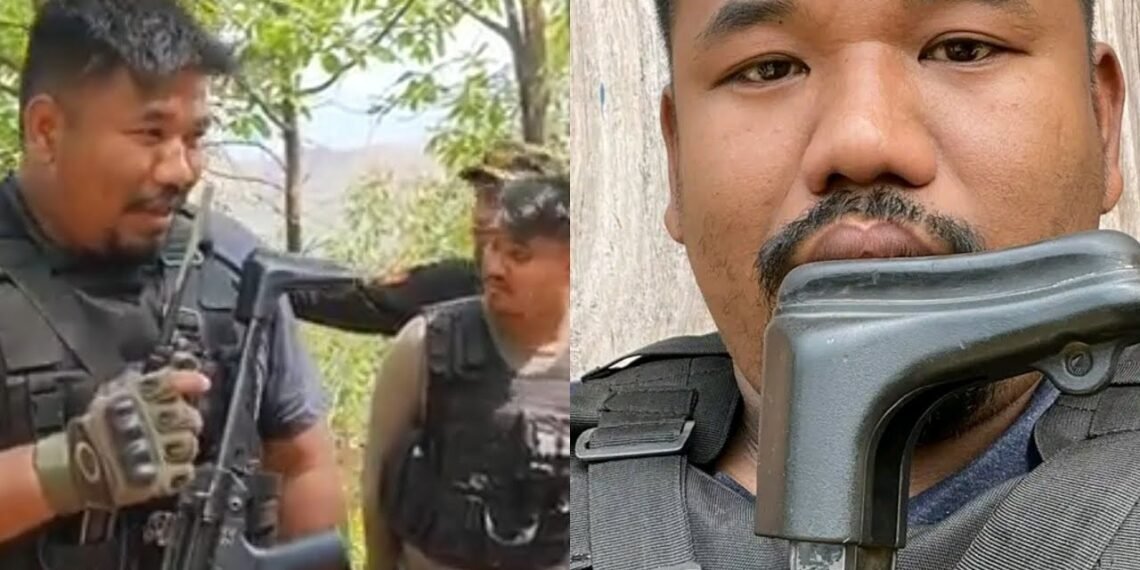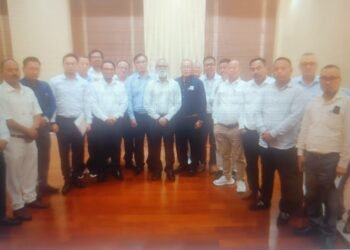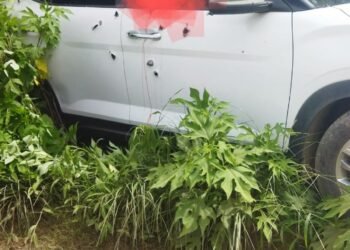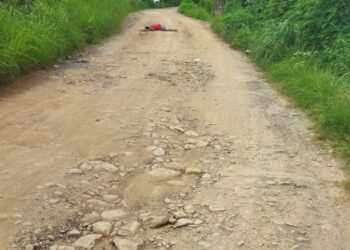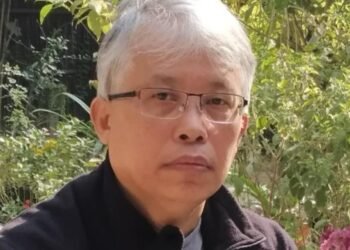As Manipur grapples with ongoing unrest, a glaring contradiction emerges: while the Kuki National Organization’s spokesperson was removed from a Delhi University panel for his affiliation with an insurgent group, Governor Ajay Kumar Bhalla met with leaders of Arambai Tenggol—a Meitei militia facing serious criminal allegations.
BY PC Bureau
Two days after Kuki National Organization (KNO) spokesperson Seilen Haokip was dropped from a panel discussion at the Delhi University Literary Festival—ostensibly because he represented an insurgent group—Manipur Governor Ajay Kumar Bhalla hosted Arambai Tenggol leaders Korounganba Khuman and Robin Mangang at Raj Bhavan on Tuesday evening. The contrast could not have been more stark.
Speaking to the media after his meeting with the Governor, Korounganba Khuman said he was hopeful that Manipur would soon embrace peace. However, he refused to divulge details of his discussion with the Governor.
When asked whether his group would surrender arms, he stated that there were certain conditions, and if they were met, “we all will surrender arms.”
Haokip, whose organization has a Suspension of Operations (SoO) agreement with the central government, was barred from speaking at a public forum meant to foster dialogue. Meanwhile, the Governor engaged with leaders of a group accused of orchestrating violence, looting police weapons, and inciting unrest in Manipur. This meeting came just days after 28 members of Arambai Tenggol surrendered in Kakching, following the Governor’s call for looted and illegal arms to be returned.
ALSO READ: Who Will Fill the Void that Dalai Lama’s Brother Left Behind?
The disparity in treatment raises pressing questions, especially given that Arambai Tenggol is widely regarded as a private militia representing Meitei society—one whose leaders and affiliated organizations were vocal in seeking Haokip’s ouster from the literary festival. While Haokip was silenced in Delhi for merely representing Kuki interests in a panel discussion, Tenggol leaders, who have been linked to violent activities and weapons looting, were granted an audience with the highest constitutional authority in the state.
To be fair, Governor Bhalla has met with representatives from all communities, and his administration has not officially discriminated against any group. No one should have objected to his meeting with those leaders of Arambai Tenggol if the intent is to persuade the militia to surrender arms and embrace peace. However, those who raised a hue and cry over Seilen Haokip’s participation in the Delhi University Literary Festival must introspect.
Another troubling question that arises here is: while Haokip represented an insurgent group that had signed a Suspension of Operations (SoO) agreement with the Centre and the state, the Arambai Tenggol was a private militia whose cadres went around carrying arms and acting as a law unto themselves. They have been involved in several cases of serious crime. In such a situation, should the Governor engage with them? That remains a question only he can answer.


ALSO READ: Manipur Waits, Modi Stays Away: Congress Hits Out at PM
Arambai Tenggol’s List of Demands to the Manipur Governor
Arambai Tenggol has submitted a set of demands to Governor Ajay Kumar Bhalla, primarily targeting issues related to immigration, tribal status, and law enforcement. These demands, which are likely to provoke strong reactions from the Kuki community, include:
1. Deportation of all illegal immigrants – A call for the immediate identification and removal of individuals deemed to be residing illegally in Manipur.
2. Implementation of the National Register of Citizens (NRC) with 1951 as the base year – Seeking to establish citizenship verification based on historical records, which could impact various communities.
3. Abrogation of the Suspension of Operations (SoO) agreement and stringent action against militant groups – Demanding the cancellation of the ceasefire-like arrangement with Kuki insurgent groups and a crackdown on their activities.
4. Complete destruction of poppy cultivation – Calling for an intensified effort to eliminate poppy farming, which the group associates with illegal activities.
5. Withdrawal of Scheduled Tribe (ST) status from illegal immigrants – Pushing for a review of tribal status and its removal from individuals who allegedly obtained it unlawfully.
6. No arrests against village volunteers, including those of Arambai Tenggol – Seeking immunity from legal action for armed village volunteers, many of whom are linked to Arambai Tenggol.
7. Scheduled Tribe (ST) status for Meiteis – Advocating for the restoration of Meitei inclusion in the Scheduled Tribe category, a demand that has been a longstanding point of contention.
Background of Arambai Tenggol and Its Leaders
Arambai Tenggol is a Meitei activist organization with a focus on reviving the indigenous Sanamahi religion among the Meitei community. The group has been described as a radical organization and has faced allegations of involvement in violent activities during the 2023–2024 Manipur violence. Both Korounganba Khuman and Robin Mangang have been at the forefront of the organization’s initiatives, advocating for the Meitei cause.
Legal Challenges and Ongoing Investigations
Despite their active engagement in community mobilization, both Khuman and Mangang are currently under investigation by the National Investigation Agency (NIA) for alleged involvement in criminal activities, including attacks on security personnel and the looting of arms. These investigations are part of a broader effort to address the violence that has afflicted Manipur, with several cases being transferred to ensure impartial proceedings.
Contrasting Engagements: Inclusion and Exclusion
The recent meeting between Governor Bhalla and the Arambai Tenggol leaders stands in stark contrast to the exclusion of Seilen Haokip, spokesperson for the Kuki National Organisation (KNO), from a panel discussion at the Delhi University Literary Festival. Haokip, who had been invited to speak on “The Great Game East: The Northeast Cauldron,” was informed just minutes before the session that his participation had been canceled due to objections from certain groups. This last-minute exclusion has been criticized as an act of academic censorship and discrimination against Kuki voices.
Calls for Consistency and Inclusivity
The juxtaposition of these events has sparked a debate on the principles of engagement and representation. While individuals under investigation for serious offenses are granted audiences with high-ranking officials, representatives of other communities are being silenced in academic and public forums. This disparity raises questions about the commitment to equitable dialogue and the upholding of freedom of speech, especially in regions fraught with ethnic and political tensions.
Cases Involving Korounganba Khuman
The National Investigation Agency (NIA) has registered cases against Khuman for his alleged involvement in attacks on security personnel and the looting of arms. One such case, titled “Attack and Firing on Manipur Police by a large number of Arambai Tenggol led by Korou Nganba Khuman,” details an incident on November 1, 2023, where Khuman and his associates were accused of armed rioting, obstructing public servants, snatching, robbery, criminal conspiracy, terrorist acts, looting firearms from police/security forces, and unauthorized use of police/defense uniforms.
In response to these allegations, women’s groups in Manipur have protested, demanding the revocation of NIA cases against Khuman. These groups emphasize the need for urgent action to address the situation.
Cases Involving Robin Mangang
Robin Mangang, also known as Khwairakpam Robin Singh, has a history of criminal charges. In 2017, he was arrested for impersonating the Speaker of the Manipur State Assembly. The incident involved making unauthorized phone calls, leading to his arrest by the Cyber Crime police.
Additionally, Mangang has faced charges related to kidnapping for ransom, personating a public servant, criminal intimidation, and obstructing lawful apprehension. These charges highlight a pattern of criminal behavior over the years.
The legal proceedings against both Khuman and Mangang underscore the ongoing efforts by law enforcement agencies to address criminal activities associated with Arambai Tenggol in Manipur.


